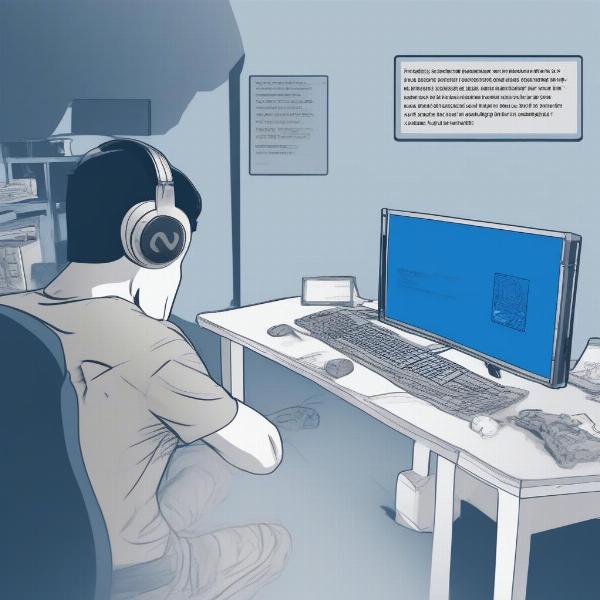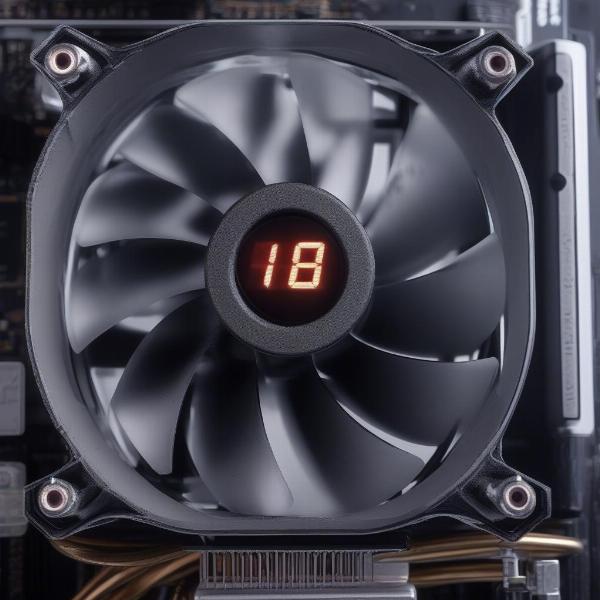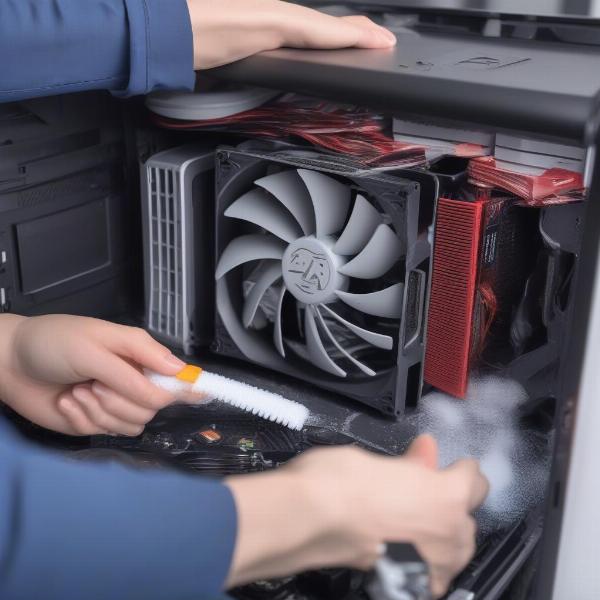Is your gaming experience constantly interrupted by frustrating crashes? You’re not alone. “Why Does My Game Keep Crashing On My Pc?” is a common question that plagues many gamers. This article dives deep into the potential culprits behind these crashes and offers effective solutions to get you back in the game.
Common Reasons Behind Game Crashes
Game crashes can stem from a variety of issues, ranging from simple software conflicts to more complex hardware problems. Pinpointing the exact cause is the first step to finding a lasting fix. Let’s explore some of the most frequent offenders.
Outdated or Corrupted Drivers
Outdated or corrupted graphics drivers are often the primary cause of game crashes. Your graphics card is the workhorse behind rendering those stunning visuals, and if its drivers are faulty, it can lead to instability and crashes. Similarly, outdated sound or network drivers can also contribute to the problem.
Overheating Components
Just like a car engine on a hot day, your PC’s components can overheat under stress, especially during intense gaming sessions. If your CPU, GPU, or even your power supply is running too hot, it can trigger a system crash to prevent permanent damage.
Insufficient System Resources
Games are becoming increasingly demanding, pushing your PC’s hardware to its limits. If your system doesn’t meet the minimum or recommended specifications for a game, it can struggle to keep up, resulting in crashes. Lack of RAM, insufficient storage space, or a weak processor can all contribute to this issue.
Software Conflicts
Sometimes, background applications or software conflicts can interfere with a game’s performance, leading to crashes. Antivirus software, overlays, or even other running games can hog resources and create instability.
Corrupted Game Files
If specific game files become corrupted, it can cause the game to crash during loading or gameplay. This can happen due to improper installation, hard drive errors, or even malware.
 Game Crashing on PC Due to Driver Issues
Game Crashing on PC Due to Driver Issues
Operating System Errors
Underlying issues within your operating system can also cause game crashes. A corrupted registry, outdated Windows version, or even a virus infection can destabilize the system and impact game performance.
Hardware Failures
While less common, failing hardware components like a faulty graphics card, RAM stick, or hard drive can also lead to frequent game crashes. These issues often require replacing the faulty component.
Troubleshooting and Fixing Game Crashes
Now that we’ve identified some common culprits, let’s dive into the solutions.
Update Your Drivers
Regularly updating your graphics drivers is crucial for smooth gaming. Visit the website of your graphics card manufacturer (Nvidia, AMD, or Intel) and download the latest drivers for your specific card model.
Monitor and Manage Temperatures
Keep an eye on your component temperatures using monitoring software like HWMonitor or MSI Afterburner. If your components are overheating, consider improving your PC’s cooling solution, such as adding more fans or upgrading to a better CPU cooler.
Check System Requirements
Before purchasing a game, always ensure your PC meets the minimum and ideally, the recommended system requirements. If your system falls short, you may need to upgrade your hardware to enjoy the game without crashes.
 PC Game Crashing Due to Overheating CPU
PC Game Crashing Due to Overheating CPU
Close Unnecessary Applications
Before launching a game, close any unnecessary background applications, such as web browsers, chat programs, or other running games. This frees up system resources for the game and reduces the risk of conflicts.
Verify Game File Integrity
Most game launchers, like Steam or Epic Games Launcher, have a built-in option to verify the integrity of game files. This process scans for and replaces any corrupted files, which can resolve crash issues.
Run System File Checker
The System File Checker (SFC) is a built-in Windows utility that scans for and repairs corrupted system files. Running SFC can fix underlying operating system errors that may be contributing to game crashes.
Test Your Hardware
If you suspect a hardware failure, you can use diagnostic tools like Memtest86 to test your RAM or check your hard drive for errors using the built-in Windows disk checking utility.
Preventing Future Game Crashes
Taking proactive steps can significantly reduce the likelihood of future crashes.
Regular Maintenance
Regularly clean your PC’s internals to remove dust buildup, which can hinder cooling performance. Also, defragment your hard drive periodically to optimize storage space.
Keep Your Software Updated
Ensure your operating system and all other software are up to date with the latest patches and updates. This not only improves performance but also addresses potential security vulnerabilities.
 Preventing Game Crashes on PC Through Regular Maintenance
Preventing Game Crashes on PC Through Regular Maintenance
Optimize Game Settings
Adjusting in-game graphics settings can improve performance and prevent crashes. Lowering settings like resolution, texture quality, and anti-aliasing can reduce the strain on your hardware.
Conclusion
Game crashes can be a frustrating roadblock, but with a systematic approach, you can identify the root cause and implement effective solutions. By understanding the common reasons behind crashes and following the troubleshooting steps outlined in this article, you can get back to enjoying uninterrupted gaming sessions. Remember, regular maintenance and keeping your software and drivers updated are key to preventing future crashes and ensuring a smooth gaming experience. Now, go forth and conquer those virtual worlds!
FAQ
-
What is the most common reason for game crashes? Outdated or corrupted graphics drivers are frequently the primary culprit.
-
How can I check my component temperatures? Use monitoring software like HWMonitor or MSI Afterburner.
-
What should I do if my PC doesn’t meet a game’s system requirements? Consider upgrading your hardware to meet the recommended specifications.
-
How can I verify the integrity of game files? Most game launchers have a built-in option for this.
-
What is the System File Checker (SFC)? A Windows utility that scans for and repairs corrupted system files.
-
How can I prevent future game crashes? Regular maintenance, software updates, and optimized game settings are key.
-
What should I do if I suspect a hardware failure? Use diagnostic tools to test your components or consult a professional.

